What Is the Science Behind Marriage and Family Therapy

Have y'all ever considered therapy for your marriage?
Have you contemplated therapy before saying, "I do?"
If you lot're reading this commodity chances are it's because you're married and struggling, thinking nearly getting married, or contemplating divorce. You're looking for answers to that historic period-old question: Tin we make this work?
Yous're not alone.
In that location's a lot of proficient news when it comes to getting and staying married. In the US and parts of England, for instance, divorce rates are dropping (Wood, 2018). Younger people are delaying wedlock, non fugitive it. They're waiting until they stop school and accept coin to support a union.
As yous read, you'll discover that one key do good is how marriage positively affects your health and longevity. If you're looking for tips, nosotros've got you covered. Go along reading.
Before you continue, we thought you might similar to download our three Positive Relationships Exercises for gratuitous. These detailed, science-based exercises will help you or your clients build healthy, life-enriching relationships.
What is Wedlock Psychology?
The definition of marriage is usually from a legal perspective. In many cultures, though not all, it's defined as betwixt a male and female. Marriage occurs in every condition and at various educational levels.
Why do humans pursue this arrangement? Why is it important? Why not live like our relatives the bonobo or chimpanzee? What is it nigh spousal relationship that garners and then much attention?
Researchers from various disciplines are exploring this. From an evolutionary perspective, information technology's viewed as strengthening and perpetuating the species. From a sociological vantage, spousal relationship creates bonds between and amidst groups. These bonds facilitate the success of the grouping.
Psychology focuses on the couple. Researchers question every believable situation around union. For example:
- What brings 2 people together?
- What keeps them together?
- What breaks them autonomously?
- How does their wedlock bear upon their wellbeing, health, and happiness?
- How does divorce affect the same variables?
- Are we supposed to exist monogamous?
- How does having children touch on the marriage bond?
- How does divorce affect children?
- How can regime actions influence the health of marriage?
- How does stress touch on the relationship?
- How does a lack of intimacy bear upon the relationship?
- What factors increase the odds of divorce?
- How does the person's upbringing affect their romantic relationships?
More recently, researchers are exploring these questions within the context of aforementioned-sexual practice couples.
From this exploration, therapists are better able to help couples before, during, and later on a crunch.
A Look at the Psychology of Matrimony
Relationships tin can be catchy. Inside a married human relationship, this is specially true. Aside from ourselves, no unmarried person in our developed lives has every bit much influence on our wellness and wellbeing as our spouse. Countless studies point to this (Robles, Slatcher, Trombello, & McGinn, 2014).
Our partner knows usa meliorate than anyone else considering of their daily proximity to usa. They know our idiosyncrasies. Over time, as we get closer, we can elevator each other up and bask in that warmth. The support in our married relationship isn't hands replaced by social back up (Holt-Lunstad, Birmingham, & Jones, 2008).
Simply when things aren't clicking, the state of affairs can take a dive. Squabbles or all-out battles tin brand information technology difficult to let go of the injure. Having a trained professional available to provide evidenced-based support can help.
The grooming and back up therapists use comes from several theories.
Psychological Theories of Union
Social Exchange Theory
Social substitution theory posits that there are costs and benefits in potential interactions. People clarify each state of affairs to determine the risks and benefits. Inside a marital relationship, this is "the cyclical patterns of transactions of valued resources, tangible or intangible, between partners and the rewards and costs associated with such transactions" (Nakonezny and Denton, 2008).
Cognitive self-disclosure
Edward Waring posited that the way to build intimacy is through cocky-disclosure. It's a bit like the Newlywed Game. The board game includes a series of questions. These let you to disclose information in a non-threatening, fun way.
Couples can play solitary using merely the questions and explore as much as they are comfortable. Each person shares something about their wants, needs, aspirations, attitudes, beliefs, and desires.
Co-ordinate to Leeuw (2015) Waring divers intimacy forth eight dimensions. They are:
- Conflict Resolution: how easily couples can resolve differences of opinion.
- Amore: the degree of emotional closeness the couple expresses.
- Cohesion: the feeling that both couples are committed to the spousal relationship.
- Sexuality: how much sexual needs are communicated and fulfilled in the marriage.
- Identity: the couple'due south level of cocky-confidence and self-esteem.
- Compatibility: the caste couples tin can piece of work and play together.
- Autonomy: how couples go independent from their families of origin and their offspring.
- Expressiveness: the degree that thoughts, beliefs, attitudes, and feelings are shared between the partners
Increasing a couple's cognitive self-disclosure is the single best way to increase their level of intimacy (Waring, 1988.)
Duplex Theory of Dear
Developed by Robert J. Sternberg, this theory combines two theories. The offset is the triangular theory of love. The second, the theory of beloved. Together they're known as the Duplex Theory of Dearest.
The first is a combination of iii elements, intimacy, passion, and decision/commitment. The centre of intimacy is the closeness, connectedness, and bond in the human relationship. Think of this as the warm-fuzzy feeling you take for a romantic partner. Romance, concrete attraction, and sex make up the passion element of the theory.
The final function of the equation, decision/commitment don't have to happen together. For example, a person could decide to honey someone, but not pursue a long-term commitment. I could also commit to a relationship without admitting their love.
Sternberg asserts that each can occur separately or together. There as well are 8 combinations.
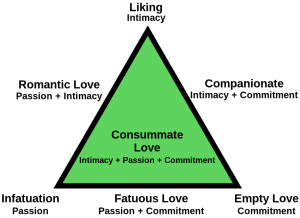
His use of triangles represents the balance or imbalance of the various elements of love. Different triangle shapes show different balances of the iii kinds of love. When counterbalanced, an equilateral triangle represents the love relationship.
Theory of Dearest equally Story
Think back to when you lot first began fantasizing near a futurity relationship. What footing did you lot use to qualify a potential mate? How did y'all decide what qualities yous wanted?
For some, media and books class the foundation for what love and loving relationships are. For others, information technology'due south through careful observation of the relationships around them. Others might combine both of those to course their perspective on choosing a partner.
Sternberg reviewed literature, motion picture, and oral descriptions of relationships. From this, he identified 26 possible love story genres. He acknowledges the number could exist infinite. Sternberg also admitted that the listing has some degree of cultural bias. It just included United states of america participants.
Still, the stories do provide insights into how people conceptualize love. Co-ordinate to Sternberg they are:
- Habit. Strong broken-hearted attachment; clinging behavior; anxiety at thought of losing a partner.
- Art. Love of partner for physical attractiveness; importance of partner always looking good.
- Business. Relationships as business concern propositions; money is power; partners in shut relationships every bit business partners.
- Collection. Partner viewed every bit "plumbing fixtures in" to some overall scheme; partner viewed in a detached way.
- Cookbook. Doing things a certain way (recipe) results = relationship being more probable to work out; departure from the recipe for success leads to an increased likelihood of failure.
- Fantasy. Often expects to be saved by a knight in shining armor or to ally a princess and live happily always later on.
- Game. Love as a game or sport.
- Gardening. Relationships need to exist continually nurtured and tended to.
- Regime. (a) Autocratic. One partner dominates or fifty-fifty controls another. (b) Autonomous. Ii partners as share power.
- History. Events of relationship form an indelible record; keep a lot of records–mental or concrete.
- Horror. Relationships get interesting when you terrorize or are terrorized by your partner.
- House and Home. Relationships take their core in the home, through its development and maintenance.
- Humour. Love is foreign and funny.
- Mystery. Beloved is a mystery and you shouldn't let too much of yourself be known.
- Police. You've got to keep close tabs on your partner to make sure he/she toes the line, or you demand to exist under surveillance to make sure you deport.
- Pornography. Honey is dirty, and to love is to degrade or be degraded.
- Recovery. Survivor mentality; view that afterwards past trauma, person tin can go through practically anything.
- Religion. Either views love as a religion, or love as a set of feelings and activities dictated by faith.
- Cede. To love is to give of oneself or for someone to give of him or herself to you.
- Science. Dear can be understood, analyzed, and dissected, just like any other natural phenomenon.
- Science Fiction. Feeling that partner is similar an alien–incomprehensible and very strange.
- Sewing. Beloved is whatever yous make information technology.
- Theater. Love is scripted, with anticipated acts, scenes, and lines.
- Travel. Love is a journey.
- War. Love is a serial of battles in a devastating just continuing war.
- Student-teacher. Honey is a relationship between a pupil and a teacher.
How do yous conceptualize love? Do you meet yourself in whatsoever of the previous descriptions?
The Gottman Method
John and Julie Gottman created the Sound Relationship House Theory. He and his wife have studied a variety of relationships for 30 years.
The goal of therapy is to reduce conflict and increase intimacy. This includes a focus on respect and amore. After initial assessments, the couple works with a therapist to refurbish their house.
Every couple'southward house consists of seven levels surrounded by trust and commitment. These are the insulation. The levels are:
- Build love maps – Show genuine interest in the internal and external world of your partner. Know your partner'southward dreams, values, and goals. Ask open up-concluded questions.
- Share fondness and admiration – Communicate affection and respect in pocket-sized ways, often.
- Plow towards instead of away – Partners tend to make pocket-sized bids for each other's attending. For example, one might notice something and point information technology out. If the other partner acknowledges this and responds, then this is turning toward. If the partner continues doing what they're doing so this is an example of turning away.
- The positive perspective – This sentiment overrides moments when negative things are happening. This but occurs when 1-3 are working well in the relationship. Gottman calls this a buffer to irritability and emotional distance.
- Manage conflict – Friendship is the basis for regulating conflict. Couples who have the get-go three ingredients tend to utilise humor and affection during conflict. Sixty-nine pct of conflicts are never solved. They're perpetual problems that be in every human relationship.
- Master couples learn how to cope with this over time through discussions. They don't let them to turn into a gridlock for their relationship.
- Brand life dreams come true – Primary couples figure out the dreams that are the subtext for the disharmonize. They laurels those dreams.
- Create shared significant – The couple feels like they're building something together. Their roles within and without the relationship take pregnant that supports them.
Gottman explains how to make a marriage work and the enquiry that backs up their theory.
The Five Honey Languages
Dr. Gary Chapman adult the five honey languages subsequently providing years of matrimony counseling. Grounded in Christian principles, the focus is on how to have healthy relationships. Chapman points out that these languages apply to other types of relationships, too.
He adamant that five behaviors are essential to a healthy, happy, long-term marriage.
- Love and affirmation; and,
- Learning how to deal with your failures through forgiveness and apology,
- Learning how to handle anger,
- Learning how to heed,
- Accept and express joy about the minor irritations.
These five ideas are the roof, walls, and foundation for the five dearest languages. The languages are the rooms within. Nosotros don't need to enter every room. We do need to know which i is most important to us and to our partner.
The v love languages are:
- Words of affirmation – Remember how your parents taught you lot to say, "delight" and "thank you"? Sometimes we forget this uncomplicated tip in our relationships. The bottom line is nosotros all love positive words from the people we respect and beloved.
- Gifts – This is what tells the other person that you're thinking well-nigh them. They don't need to be expensive. They exercise need to be thoughtful.
- Acts of service – Doing things for your spouse like household chores fall into this category. Doing them without being asked is even better if this is your partner's love language.
- Quality time – Spending uninterrupted time together listening and talking creates stronger bonds. The TV/calculator/phone is off. Your attention is on each other and nothing else.
- Concrete touch – Holding hands, kissing, sex, hugging, and playfulness all are ways to express love.
According to Chapman, anybody has a primary love language. If you're interested in finding out more than, The five Honey Languages site offers a free quiz. It besides includes an app and so that you can take the quiz, then connect with your partner.
What are the Different Marriage Types?
There are several means to look at marriage 'types.' I way is to break marriage downwardly into two: ceremonious or religious. Many ceremonious unions include a religious element, though this isn't necessary. And, diverse religions typically recognize ceremonious marriages. States oft recognize religious marriages, though licensing all the same might exist necessary. This is the easiest distinction betwixt marriage types.
Other definitions of marriage types exist. These include either a description of the marriage style, or the couple'due south interaction within the marriage.
There are iv bones styles or approaches to marriage. In sociological terms they are:
Polygyny – 1 male, more than than ane wife; this is farther broken down into sororal and not-sororal. The former involves sisters, the latter doesn't.
Polyandry – One wife, more one married man; this as well includes fraternal and non-fraternal union. The onetime involves several brothers with the same wife; the latter doesn't. Depending on the cultural traditions, the children choose their father, or a ritual determines this.
The above are forms of polygamy.
Grouping marriage – 2 or more than men and women join together as mutual spouses; children belong to the group.
Monogamy – The about common form of marriage in the world is between a man and a woman. There are ii types of monogamy: straight and serial. Straight monogamy doesn't allow for remarriage due to death or divorce. Serial monogamy does.
Some other union category worth mentioning is an open wedlock. This type may or may not include both spouses. It allows either party to have sexual practice with someone other than their spouse. This isn't considered infidelity past the couple. They might besides do this equally a couple, for example, "swinging" is a type of open wedlock.
1 could argue that other categories or types exist, but these are the most common. Aforementioned-sex marriages fit into monogamous, swinging, or open marriages much like heterosexual marriages.
Psychologists describe marriage based on how the couples interact within the matrimony. This varies based on the predominant theory employed past the psychologist(due south) or therapist. For example, the Gottman Institute describes v types. The first three are happy types. There are pros and cons to each.
- Conflict avoiders – These couples have common areas of agreement where they're interdependent. They don't spend much time persuading or negotiating with each other. They've got established boundaries and are otherwise independent with separate interests.
- Volatile couples – This relationship is emotional. They tend to engage in persuasion and debate but are respectful of each other. When this type of couple debates, they utilise humour.
- Validating couples – This couple is a cross betwixt the previous two. They engage in perspective-taking more than the others and are empathetic. They choose their battles, and after ane, they tend to compromise. These couples aren't overly emotionally expressive.
- Hostile couples – This human relationship blazon has high levels of defensiveness and criticism. There are little-to-no perspective-taking and a lot of contempt.
- Hostile-discrete couples – This couple is down to their kings on the board. Information technology'south a constant state of stalemate. They don't nit-option at each other and are emotionally aloof. This couple eventually divorces.
12 Interesting Union Psychology Facts
How do people decide to get married? What factors are well-nigh important? The Pew Enquiry Center has asked Americans this and other questions since at least 1990. Hither are some of their findings.
- 88% of Americans believe beloved is a very of import reason to get married (2013).
- 71% believed that it was very important for men to be proficient financial providers for the family (2017).
- 64% said that having shared interests helps people stay married (2015).
- 61% believe a satisfying sexual relationship is very of import to a successful union (2015).
- 56% cite sharing household chores as something that helps people remain married (2015).
- Cohabitation is on the ascent in the Usa. It'south rising quickest among ages fifty and older (2016).
- The majority of people built-in later on the Silent Generation (1920s-mid-1940s) believe that cohabitation doesn't hurt gild (2019).
- Fewer previously married women than men remarry. In 2014, 54% of women said they didn't desire to remarry.
- In 2015, 17% of newlyweds intermarried. In 1967 information technology was 3% (2017). Notation: Intermarriage occurs when people marry someone of a dissimilar race or ethnicity.
- 62% of Americans favored same-sexual activity marriage in 2017.
- Gen Zers and Millennials tend to view same-sex activity marriage and intermarriage favorably. They believe either or both are good for gild (2018).
- While many marriages are between people of different religions, this isn't true for politics. Most (77%) Republicans and Democrats marry someone who shares their political views (2016).
Spousal relationship and Family Therapy
The decision to seek therapy oft is hard. Couples know something isn't working only are fearful. What if the problem is them and not their partner? What if they notice things that they don't want to know? Avoiding the bug is easier than dealing with them head-on.
The point of therapy isn't to place arraign. While there are several approaches a therapist tin apply, blame isn't an effective tool. Therapists provide space for the couple to explore and revitalize their human relationship.
The central is finding a therapist whose arroyo tin can work for the marriage and the family. Their role is to give couples an objective perspective on shared experiences. They often provide resources and tools with which couples tin experiment exterior of sessions. These can include different communication techniques and small behavioral changes.
Many therapists will teach some form of conflict management. A popular version is to use "I" statements with a feeling. For example, "I experience lonely, and miss you when y'all're away for nights at a fourth dimension. Is there some fashion we could detect more fourth dimension together before yous get out on your next trip?"
Gottman's inquiry demonstrates that couples in conflict become better outcomes by:
- Using a gentle startup. Instead of attacking your partner, try stating how y'all experience and what you want or need.
- Compromising with each other.
- Calming downward. Have a time out when your blood is boiling. No ane thinks conspicuously when they're angry. Gottman'southward research shows that couples use more than humor after using a time out.
Beware the Four Horsemen
Every bit you heard in the previous Gottman video, he's able to predict divorce with more than than 95% accuracy. Avoid the Four Horsemen at all costs. They are:
- Criticism is "a manner of complaining that suggests that your partner's personality is lacking."
- Defensiveness involves ane of two things: righteous indignation or the innocent victim.
- Disrespect and contempt are the all-time predictors of divorce. This is talking down to your partner. It includes calling the person names.
- Stonewalling is "emotional withdrawal from conflict." Airtight off torso language is a signal of this beliefs.
Solution-Oriented Brief Therapy, also chosen Solution-Focused Brief Therapy
Developed by Steve de Shazer, Insoo Kim Berg and colleagues in the 70s, SFBT is "time to come-focused and goal-directed" (Institute for Solution-Focused Therapy, n.d.)
The appeal of this grade of therapy is its focus on the present rather than the by. The therapist is less concerned with your history than how you believe you can improve your life. Practitioners believe everyone has the necessary skills to create or discover solutions. What is sometimes needed are tools, resource, and a nudge. This blazon of therapy emphasizes establishing clear, realistic goals.
If you're familiar with and like SMART goals, and then SFBT could be a good fit.
Therapists use a serial of specialized conversations to assist the customer(s). These discussions help the person develop and accomplish their unique solutions. Questions push button the person to identify times when they've solved previous problems. In doing this, the client might find a solution to the current challenge. If this isn't possible, and then the therapist might explore when the problem is less of an upshot, and why that is.
Hallmarks of this approach are the use of nowadays or future-based questions, compliments, and encouraging clients to do what'due south working.
Emotionally-Focused Therapy (EFT)
Emotionally Focused Therapy works in education couples to empathise and reorganize their responses. Dr. Sue Johnson explains that it's based on research into bonding. It's experiential and systemic. The goal is to create a more secure relational bond. Change happens in the procedure. The therapist creates a safe space.
EFT takes betwixt eight-20 sessions. The therapist goes into what'southward happening correct now in the session. They point out the process that's occurring in interactions and emotions. Then they dive deeper into the emotions. EFT therapists follow v steps. Check it out in this video.
How Tin can Marriage Therapy Assist Marital Problems?
The hard truth is that therapy might not help. If either partner has made the decision to divorce, information technology can exist hard to opposite. If the couple has waited too long before seeking help, information technology also might be ineffective. Gottman'southward inquiry shows that couples wait an average of 6 years before getting assist (Gaspard, 2015).
But for those who've not waited as well long, or those who commit to change, the procedure can help. Gaspard (2015) offered the following ways it does:
- If toxic human relationship patterns can be identified early on and agreed upon, the process of real change can begin.
- A motivated couple can brainstorm to explore their problems from a new perspective and learn new means to recognize and resolve conflicts as a event of the tools provided by the therapist.
- Partners tin begin to build trust and improve communication that may have eroded the quality of their interactions.
- A couples' advisor tin can provide "neutral territory" to help couples agree upon and work through tough problems with back up.
- Couples can determine to rebuild their wedlock and brand a renewed delivery or clarify the reasons why they need to separate or end the union.
The Function of a Psychologist in Counseling
According to the APA, "counseling psychologists help people with physical, emotional, and mental health issues amend their sense of wellbeing, alleviate feelings of distress, and resolve crises." This is the minimum requirement a customer can expect.
Supervised training is an added expectation for marriage and family therapy (MFT). Supervision is with a licensed clinician for a minimum of ii years.
In the US, a person in this field has earned an undergraduate caste in counseling, psychology, sociology, or social piece of work. Master's level piece of work in counseling or marriage and family therapy generally takes 2 years. Each land has dissever licensing requirements that ordinarily include an test.
The advisor or therapist's chore is to:
- Observe interactions
- Evaluate and help resolve issues
- Diagnose and treat disorders
- Guide through difficult transitions
- Identify challenging relational or behavior patterns
- Supplant dysfunctional behaviors with healthy ones
The therapist isn't there to tell you to finish your spousal relationship. They won't take sides. You and your partner are responsible for the outcomes you seek. The therapist is your guide and a neutral third political party.
How to find a corking therapist
Michele Wiener-Davis (2009) suggests the following when seeking a therapist:
- Confirm that the therapist has the training and experience in marital therapy.
- Ask the therapist his/her view about divorce. Is the therapist solutions-oriented or volition she/he suggest y'all get a divorce considering the situation is tough?
- Both you and your partner should feel comfortable with the therapist. The therapist needs to respect your perspectives.
- Empathize how your therapist views spousal relationship. If the therapist is rigid in their definition of what makes up a happy union, then that's a ruddy flag.
- Understand that a therapist can't tell yous when you should give up on your marriage.
- Establish goals early on and ensure that you're making progress toward them. If not, address this with the therapist.
- It might exist useful to empathize some of your past to move forward, but if this is the focus, then find a more future-oriented therapist.
Her approach is intensive and solutions-focused. She'due south the author of several books including "Divorce Busting." Listen to how she explains the sexual activity-starved spousal relationship.
thirty Helpful Questions for Marriage Counseling
You've decided to seek help, at present what? Let's have a look at a few "nuts & bolts" questions first. Every country'south wellness coverage varies so some of these questions might not bear on you. When arranging to visit a therapist, you'll need to know the post-obit upfront if yous're in the US.
- What type of insurance do you lot accept? This can vary based on the region in the US.
- What are your fees? Yous demand to know this if you're paying a deductible or completely out-of-pocket.
- Practice you lot offer a sliding fee scale based on income?
- What type of therapy do you use? You want to know if it'southward compatible with you lot and your spouse.
- How long accept you lot been a therapist?
- Take you worked with couples like u.s. before? The training for a psychologist, psychiatrist, and marriage counselor aren't the same. The first two might not have specific marriage and family counseling experience. The spousal relationship and family counselor will have had a minimum of two years of supervised training (U.s.a.).
- What should we wait from therapy?
- How many sessions should we attend?
- Exercise nosotros always need to come up together?
- When might it be helpful to attend separately?
Later on the "basics & bolts" are out of the way, it's time for y'all and your partner to respond a few questions nearly your relationship. Psychotherapist Racheal Tasker suggests creating a list. These are better answered solitary, starting time.
- What are the chief issues with your relationship?
- Of those, what are the nigh important to you lot?
- Do y'all desire a divorce? If one of you does, only the other doesn't, then counseling might be benign.
- Are y'all going through a rough patch or practice y'all have irreconcilable differences?
- How practise you feel virtually the relationship? Think well-nigh this globally, rather than from a day-to-day perspective.
- What practice you want to become from counseling?
- What are your reasons for wanting to work things out?
- Are you willing to alter to brand improvements in your human relationship?
- How do you see the future?
- Do y'all experience accepted in the human relationship?
Hither are a few more than questions you might want to discuss before or during counseling. These are difficult and painful, but necessary.
- What bothers you about your human relationship?
- What kind of dearest do you feel?
- Do y'all trust me?
- What tin can I do to renew your trust?
- Are yous involved with someone else?
- Have you considered having an matter? This opens the door for you to explore why.
- Are there any by conflicts we should resolve?
- Practise you lot feel you tin can communicate with me?
- Have we tried everything?
- Practice you feel accepted in the human relationship?
When you've washed this you're gear up to experience your beginning session.
A Expect at the Psychology of Incompatible Couples
We've all met couples who seem incompatible. They're the "opposites attract" phenomena. She likes sports; he likes opera. She's introverted; he's extraverted. The listing goes on and on. For some of these couples existence opposite works, but for many more, it leads to constant disharmonize. But does that as well mean divorce? Not necessarily.
Compatibility isn't simply what nosotros have in common on the surface. It's too the values, beliefs, and personality traits nosotros share. True, even these can alter over time.
What makes united states more than or less compatible? How important is information technology anyway? Near couples fight about money, sex, and kids if they have them. Gottman says compatibility comes down to how the human relationship supports your life'southward mission. He believes we must connect emotionally and be responsive to each other's bids for attending (Estroff-Marano & Flora, 2004).
Neil Clark Warren, founder of eHarmony, is an skillful in compatibility. There are 29 compatibility areas covered by eHarmony. Some of them are:
- 2 emotionally healthy people
- Stiff character
- Like intelligence level
- Same kind of values
- A keen sense of humor
- Similar energy
- Similar industriousness
- Ii/three mutual interests
- Curiosity
People married 7 – 10 years, who met through eHarmony, accept a 3.86% divorce rate (PNAS 2013). People who met online have a "slightly higher marital satisfaction and lower rates of marital breakup than coming together a spouse through traditional (off-line) venues." Online services augment your dating pool. This leads to an increased opportunity of finding a compatible partner.
Ii central ingredients to the success of incompatible couples are generosity and adaptability. Become more than generous with your fourth dimension, attention and words. Understand that similar you might be irresolute, your partner can, too.
Hither's how Warren explains compatibility.
If you're curious virtually how compatible you and your mate are, and you didn't run into through eHarmony, check out Instant Chemical science. They adult a Deoxyribonucleic acid-based test to determine your compatibility with your partner. The exam covers iii areas: biocompatibility, neuro-compatibility, and psychological compatibility. You lot spit into a tube, transport it to their lab, and log into their site for a psychological assessment and your results.
The Psychology of Divorce
Anyone who has experienced divorce would say it's rarely, if ever, painless. There are many reasons people divorce including infidelity, growing autonomously, and financial disagreements.
Once the couple decides to divorce, they're probable to experience stages of grief. Elizabeth Kubler-Ross wrote about five in her book "On death and dying." They are: deprival and isolation, anger, bargaining, depression, and acceptance.
No two people experience these in the same style. Going through each stage isn't a need. There's also no specific social club. For example, you might go from anger to deprival, to bargaining, and then acceptance.
I of the ascendant theories about divorce accommodation is the divorce-stress-aligning model. It postulates that the process of divorce is continuous. It begins while the couple still lives together. After finalizing the divorce, the couple notwithstanding experiences stressors.
Included in this theory are ii explanations for how people perceive their experience. The start is the crisis model. People realize the negative consequences of divorce are temporary. After a menstruation of time, they adapt to their circumstances and stressors.
Some people experience chronic strain that is a constant, on-going stress. They don't view the process every bit temporary. In fact, these individuals might never fully recover from the divorce.
Barnet (1990) establish that in that location are differences between men and women. Men experienced:
- shorter pre-decision periods
- less pre-decision stress
- lower post-divorce adjustment
- more than external locus of control scores
She also found that childless couples fared better. They reported less problems, less post-decision stress, and shorter pre-decision periods.
Similar virtually life transitions coping with divorce takes time, patience, and support. Support can come up from family, friends, and/or a therapist.
How to All-time Deal with Matrimony Issues and Bug
Research (2010) indicates that the mode couples explicate each other's shortcomings is revealing. For example, researchers asked newlyweds about the kinds of explanations they used over a six-month catamenia. They also asked the couples to describe and rate stressful events outside of their marriage.
The assessments, conducted every six months for four years, showed the post-obit:
- depression stress equalled more charitable explanations by spouses for each other's negative shortcomings
- high stress equalled an disability to provide charitable explanations even though the person did and then during depression-stress times.
"Enduring vulnerabilities" have a lot to do with how nosotros explain the behavior of other people. Vulnerabilities include cognitive styles, personality traits, and childhood experiences. These combine with various stressful encounters (piece of work, money worries, health issues, etc.) and inform our explanations.
Karney developed the Vulnerability-Stress-Adaptation-Model of Marriage (VSA). Information technology describes how adaptive processes affect satisfaction over time.
When couples can think globally about the negative behaviors, their satisfaction is higher. Those who become stuck in the day-to-twenty-four hour period grind of the relationship, are less happy.
Not all stress is bad and our mindset around it matters. Managing or reducing it leads to greater wellbeing and better health (McGonigal, 2015).
How Can We Restore a Marriage?
The answer to this question isn't simple. Information technology all depends on how the marriage broke down. For example, if over time you've go disconnected then reconnecting is your priority. Kyle Benson (2016) from The Gottman Establish suggests 3 ways to exercise this.
They're from Gottman's research and are included in his books. According to his research money and sex aren't the reasons couples argue. The real issue is a lack of emotional connection. Take charge and do the post-obit:
- Have bids for connection
- Understand each other's honey maps
- Build a civilization of appreciation and respect
What if your problem is around infidelity? Trust has eroded. The kickoff question is whether you can trust your partner again. Do you feel that you could commit if trust was restored? Two other questions Terry Gaspard (2016) suggests are:
- Take y'all let go of your acrimony and resentment well-nigh your partner'southward betrayal and are you able to movement forward?
- Can you forgive your partner for their deportment?
If you tin, then it's time for your partner to step up. Gottman developed the Trust Revival Method for couples in this situation. In brusque, it involves iii phases: atone, attune, and attach.
During amende, the cheater must prove to exist trustworthy. This volition probable take time during which he can't arraign the spouse for what happened. The 1 who cheats must accept responsibility for the affair without defensiveness. Honesty and full disclosure are a requirement. Some other requirement is a "no second take a chance" rule. The cheater must cut all ties to the onetime lover.
Attunement only happens subsequently forgiveness. In this phase the couple is ready to motility forrad, but they too must acquire how to handle conflicts better. The cheater must commit to making the relationship a priority. Chances are if you accept children, they know what happened to some caste. Your in-laws and close friends too probably know.
During this phase, the couple needs to denote to these people their intention to recommit to their marriage. This allows those people to be a source of support for the couple.
Zipper involves reconnecting with your partner through physical intimacy. This must happen in club to restore the human relationship.
Affairs are painful to recover from, but information technology'southward possible. Gaspard recommends contacting an experienced therapist.
What Makes a Happy Marriage?
The American Psychological Association (APA) article titled Nine psychological tasks for a practiced spousal relationship borrowed the following ideas from Judith S. Wallerstein, Ph.D., co-author of the book "The Good Matrimony: How and Why Dearest Lasts."
- Separate emotionally from the family unit you grew up in; not to the point of estrangement, but enough so that your identity is split up from that of your parents and siblings.
- Build togetherness based on a shared intimacy and identity, while at the same time ready boundaries to protect each partner'south autonomy.
- Constitute a rich and pleasurable sexual relationship and protect it from the intrusions of the workplace and family obligations.
- For couples with children, embrace the daunting roles of parenthood and absorb the impact of a baby's entrance into the union.
- Acquire to continue the work of protecting the privacy of you and your spouse as a couple.
- Face up and master the inevitable crises of life.
- Maintain the strength of the marital bond in the face of adversity. The matrimony should be a safe haven in which partners are able to express their differences, anger and disharmonize.
- Employ sense of humour and laughter to keep things in perspective and to avert boredom and isolation.
- Nurture and comfort each other, satisfying each partner'south needs for dependency and offering continuing encouragement and support.
- Continue alive the early on romantic, idealized images of falling in love, while facing the sober realities of the changes wrought by time.
There are recurring themes you might notice as yous continue reading. Humor, sexual intimacy, condolement, and boundaries are a few.
vi Tips for a Successful and Happy Marriage
Seriously, though, when either partner is grumbly and unhappy information technology negatively affects the other. Negative emotions are as contagious every bit the common cold. No one likes having a sore pharynx and sniffles. With the proper care and attentiveness, nosotros can diminish the symptoms. Here's how:
- Use more than humor. This doesn't mean yous demand to get slap-up at telling a joke. You can watch comedians or funny shows together. Humor reduces stress and feet. (Mayo Clinic, n.d.)
- Exercise together. This increases happiness and reduces stress. Working out with another person pushes united states of america to work out more efficiently. Want an bewitchery boost? This will practice it. The physiological symptoms mimic those of romantic attraction (DiDonato, 2014).
- Learn mindfulness-based stress reduction. Mindfulness is martial arts for the mind. It'southward a way of life. There'due south no mysticism involved. Mindfulness is purposeful and focused on the present experience. It's awareness, acknowledgment, and credence. Developed by Jon Kabat-Zinn, it's helped thousands of people manage chronic pain. A costless culling is available through Palouse Mindfulness.
- Have sexual practice. Regular sexual activity triggers your sex bulldoze, sense of romance, and attachment. It also releases testosterone, dopamine, and oxytocin.
- Fight improve. Endeavor Gottman's arroyo.
- Soften your start-up
- Learn to send and receive repair attempts
- Sooth yourself and each other
- Compromise
- Accost emotional injuries
- Larn how to apologize.
After several years, someone approached Chapman near the language of apologies. Intrigued, he researched this and identified five means people tend to repent.
- Expressing regret – "I'yard sorry" without the "but."
- Accepting responsibility – "I was wrong" without excuses
- Offering to make restitution – "How can I make things right?" "What can I practise?"
- Genuinely repenting/Expressing desire to alter – Give testify that you're changing your beliefs.
- Requesting forgiveness – "I hope you can forgive me."
Like the 5 love languages, apologies also are individual. Nosotros favor one over the others. The nature of the offense tin dictate which apology to use peculiarly if it's a big transgression. In this example, you might need to use all 5.
Forgiveness is part of the apology process. Information technology requires us to confess and apologize so that forgiveness is possible. Here's what it doesn't do:
- Destroy our memory of what happened
- Cease the emotions attached to the memory
- Remove the consequences of the transgression
- Rebuild trust – forgiveness opens the door to the possibility of trust
- Always consequence in reconciliation
What if the person offends you, but doesn't apologize?
Y'all go to the person and "lovingly confront" them. This opens the door for forgiveness if the person now apologizes.
If the person still doesn't apologize, then you release your anger toward the person then that you tin move forward.
Chapman spoke most these ideas from a biblical perspective in 2013 while speaking at Wheaton College.
20 Books on the Topic
Whether y'all're married or in a long-term, single relationship, struggles are bound to surface. Luckily, in that location are plenty of academic experts and experience-based-experts sharing tips and strategies. Post-obit are an assortment of books that might assistance y'all. Some are secular, and some Christian, but all intended to assistance you lot reconnect with your partner.
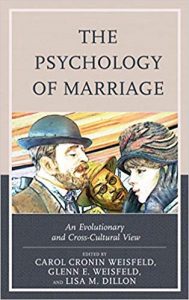 i. The Psychology of Wedlock: An Evolutionary and Cross-Cultural View – Carol Cronin Weisfeld, Glenn E. Weisfeld, and Lisa Dillon
i. The Psychology of Wedlock: An Evolutionary and Cross-Cultural View – Carol Cronin Weisfeld, Glenn E. Weisfeld, and Lisa Dillon
The Weisfeld'south have conducted union research for 30+ years. They've examined relationships around the world to learn what makes them work or not. This compilation of articles includes topics such as:
- The functions, evolution, and development of marriage
- Whether culture, sex differences, similarities, and personality are important in union
- How families are changing in diverse countries including Russian federation, China, and Brazil
- The role humour plays in spousal relationship
- Sex and cheating
- Hurting points in marriage
- Cantankerous-cultural wedlock
The book is great for wedlock and family unit therapists. It includes the Marriage and Relationship Questionnaire (MARQ). This tool is useful in any cultural setting for heterosexual and same-sex couples.
Available on Amazon.
 2. The Good Spousal relationship: How and Why Dear Lasts – Judith South. Wallerstein and Sandra Blakeslee
2. The Good Spousal relationship: How and Why Dear Lasts – Judith South. Wallerstein and Sandra Blakeslee
Through inquiry, Wallerstein identified four types of marriage: romantic, rescue, companionate, and traditional.
The "Nine psychological tasks for a good marriage" article previously referenced came from her work.
For more than information read this review from Utah Valley Academy.
Available on Amazon.
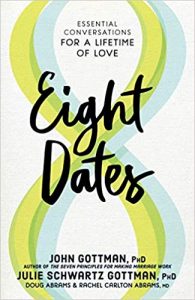 3. Eight Dates: Essential Conversations for a Lifetime of Love – John Gottman Ph.D. and Julie Schwartz Gottman Ph.D., Doug Abrams, and Carlton Abrams M.D.
3. Eight Dates: Essential Conversations for a Lifetime of Love – John Gottman Ph.D. and Julie Schwartz Gottman Ph.D., Doug Abrams, and Carlton Abrams M.D.
The couple's newest book is a fun and creative approach to connecting with your spouse. You feel eight dates focused on a key issue.
For example, trust, conflict, sex activity, money, family, gamble, spirituality, and dreams.
Interactive activities and prompts keep you lot and your partner engaged.
Available on Amazon.
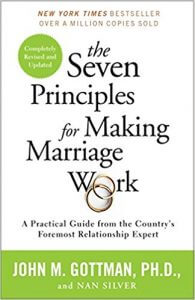 4. The Seven Principles for Making Marriage Work: A Practical Guide from the Land's Foremost Relationship Expert – John Gottman PhD and Nate Argent
4. The Seven Principles for Making Marriage Work: A Practical Guide from the Land's Foremost Relationship Expert – John Gottman PhD and Nate Argent
This book is a culmination of Gottman's research.
Information technology explains the elements of a lasting matrimony (covered in the Psychological Theories of Union section.)
Bachelor on Amazon.
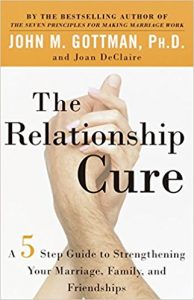 5. The Relationship Cure: A 5 Step Guide to Strengthening Your Marriage, Family, and Friendships – John Gottman
5. The Relationship Cure: A 5 Step Guide to Strengthening Your Marriage, Family, and Friendships – John Gottman
Gottman and DeClaire introduce the concept of the emotional "bid."
These are the small actions partners brand to go attending.
The book includes questionnaires and exercises that volition alter the quality of your relationships.
Available on Amazon.
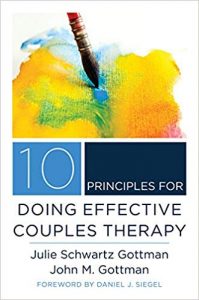 half-dozen. 10 Principles for Doing Effective Couples Therapy (North Series on Interpersonal Neurobiology) – Julie Schwartz Gottman, John M. Gottman Ph.D., and Daniel J. Siegel One thousand.D.
half-dozen. 10 Principles for Doing Effective Couples Therapy (North Series on Interpersonal Neurobiology) – Julie Schwartz Gottman, John M. Gottman Ph.D., and Daniel J. Siegel One thousand.D.
From an Amazon reviewer, "x Principles for Doing Effective Couples Therapy" presents practical and specific suggestions that would be helpful for whatsoever therapist working in the oft highly charged atmosphere of couples therapy.
Bachelor on Amazon.
 vii. The 5 Beloved Languages – Gary Chapman
vii. The 5 Beloved Languages – Gary Chapman
This applied and insightful tool helps y'all reconnect with your partner.
You'll learn your partner'due south love language and how to speak it, while likewise discovering yours.
Available on Amazon.
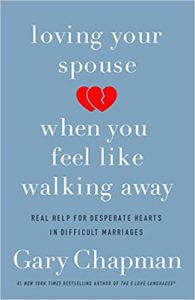 8. Loving Your Spouse When You lot Experience Similar Walking Away: Real Assistance for Desperate Hearts in Hard Marriages – Gary Chapman
8. Loving Your Spouse When You lot Experience Similar Walking Away: Real Assistance for Desperate Hearts in Hard Marriages – Gary Chapman
Marriage isn't easy. This volume helps you better empathize your partner.
You'll also acquire to take responsibility for your thoughts, feelings, and behavior.
Each chapter covers serious challenges such as controlling or abusive partners, alcoholic or workaholic behaviors, and adultery.
Bachelor on Amazon.
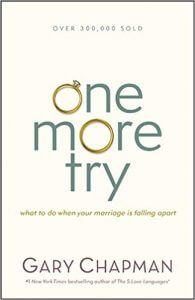 9. 1 More than Try: What To Do When Your Matrimony is Falling Apart – Gary Chapman
9. 1 More than Try: What To Do When Your Matrimony is Falling Apart – Gary Chapman
Chapman'south perspective is biblical. Many of his lectures and books tackle marital strife from this indicate of view.
Christian or not, this volume can help you lot rebuild your marriage.
Fifty-fifty when you and your partner dissever in that location is hope. Chapman shows you how in this book.
Available on Amazon.
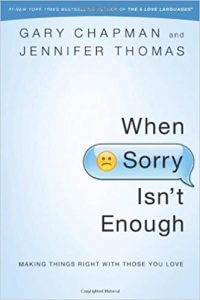 ten. When Sorry Isn't Enough: Making Things Right with Those You lot Dearest – Gary D. Chapman
ten. When Sorry Isn't Enough: Making Things Right with Those You lot Dearest – Gary D. Chapman
Ever wonder why your spouse isn't accepting your apology?
This book volition teach you how to apologize then that the recipient feels your apology.
According to Chapman's enquiry, at that place are several ways to apologize. Getting it right can make the divergence between sleeping on the couch or cuddling in bed.
Bachelor on Amazon.
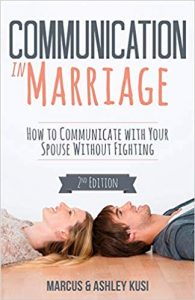 xi. Communication in Marriage: How to Communicate with Your Spouse Without Fighting (Better Marriage Series) – Marcus Kusi and Ashley Kusi
xi. Communication in Marriage: How to Communicate with Your Spouse Without Fighting (Better Marriage Series) – Marcus Kusi and Ashley Kusi
Although they're non professionals, the Kusi'due south take useful information to share about spousal relationship. Their books are piece of cake, quick reads, filled with actionable communication.
Written by a couple for newly-married couples, the text is engaging, and the tools well-researched. The Kusi'due south offering valuable insights and perspectives based on their journeying.
Y'all'll have abroad ideas for how to communicate through hard emotions without acrimony. Their recommended reading list and reference section are worth a expect.
Bachelor on Amazon.
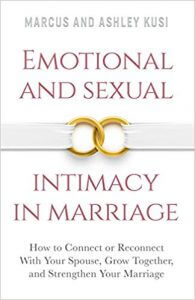 12. Emotional and Sexual Intimacy in Marriage: How to Connect or Reconnect With Your Spouse, Grow Together, and Strengthen Your Marriage (Better Matrimony Series) – Marcus Kusi and Ashley Kusi
12. Emotional and Sexual Intimacy in Marriage: How to Connect or Reconnect With Your Spouse, Grow Together, and Strengthen Your Marriage (Better Matrimony Series) – Marcus Kusi and Ashley Kusi
Outgoing and downward-to-globe, this book offers suggestions, tips, and questions partners can explore.
If you're lamenting the days when y'all talked for hours with each other, then this volume might exist useful to y'all.
Available on Amazon.
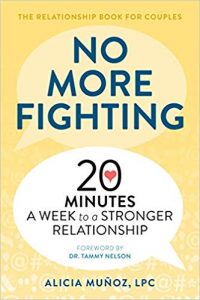
13. No More Fighting: The Relationship Book for Couples: 20 Minutes a Calendar week to a Stronger Relationship – Alicia Munoz LPC
We all argue in some class with our partners. Whether it's the silent handling, abstention, or an all-out verbal barrage, we practice it. Unfortunately, the aftermath can be hard to clean upwardly.
Munoz offers solid strategies for better navigating the inevitable challenges in any human relationship.
Topics include everything from self-care to polyamory.
Bachelor on Amazon.
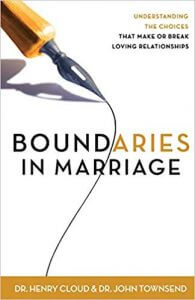 14. Boundaries in Marriage – Henry Cloud and John Townsend
14. Boundaries in Marriage – Henry Cloud and John Townsend
Based on Biblical precepts, Cloud and Townsend offer ten laws of boundaries. (Downloadable PDF) Applying them can help partners ameliorate understand hurting points and egregious mistakes. The authors prove y'all how to move past them and rebuild.
For those unfamiliar with the 10 laws, they are:
- Sowing and reaping
- Responsibility
- Power
- Respect
- Motivation
- Evaluation
- Proactivity
- Green-eyed
- Activity
- Exposure
Bachelor on Amazon.
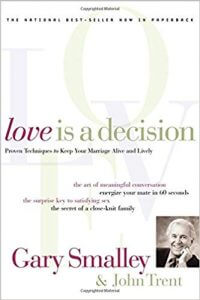 15. Dear Is A Determination – Dr Gary Smalley and Dr John Trent
15. Dear Is A Determination – Dr Gary Smalley and Dr John Trent
Smalley is a family counselor. Called a "must read manual for marriage" by an Amazon reviewer, this book is one guide to making a wedlock work.
He'southward authored or co-authored 16 books about relationships. In this book, he and Trent teach y'all how to honor your spouse, proceed courtship alive, and rebuild trust. They also explore how to put your family first.
Available on Amazon.
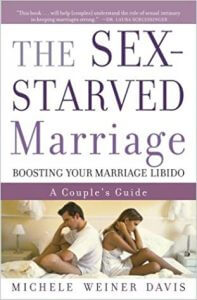 xvi. The Sex-Starved Matrimony: Boosting Your Marriage Libido: A Couple's Guide – Michele Weiner Davis
xvi. The Sex-Starved Matrimony: Boosting Your Marriage Libido: A Couple's Guide – Michele Weiner Davis
If you and your partner aren't connecting sexually, this volume might be helpful.
Weiner Davis is a sex therapist who has worked with countless couples to rebuild their connection.
She'south straightforward in her approach and assay.
Bachelor on Amazon.
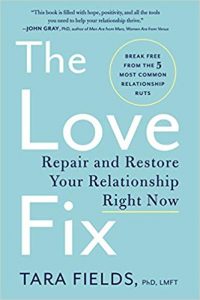 17. The Love Fix: Repair and Restore Your Relationship Correct Now – Tara Fields PhD
17. The Love Fix: Repair and Restore Your Relationship Correct Now – Tara Fields PhD
Fields is a licensed marriage and family therapist. She asserts that there are 5 common conflicts couples feel.
The trick is knowing which disharmonize surface during a fight. Afterwards you identify it, then you lot tin explore fears you might harbor.
Her last footstep teaches partners to make it touch with their needs then that they tin can grow together. The focus is on developing gratitude, respect, and trust.
Available on Amazon.
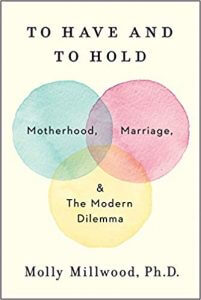 xviii. To Have and to Concur: Motherhood, Union, and the Modern Dilemma – Molly Millwood PhD
xviii. To Have and to Concur: Motherhood, Union, and the Modern Dilemma – Molly Millwood PhD
This volume explores the wellbeing of new moms and the wellbeing of their relationship.
If you lot're worried about losing your identity later having children, this book is a adept choice.
If you already fear yous've become a shadow of your former cocky, Millwood's insights might help you.
Available on Amazon.
Bonus reading: The following books aren't specifically about marriage. They are nearly self-improvement and personal growth. Oftentimes, focusing on the self is a way to improve i's relationships with others.
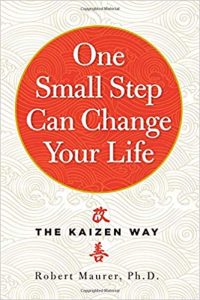 19. 1 Small Pace Can Change Your Life: The Kaizen Style – Robert Maurer Ph.D.
19. 1 Small Pace Can Change Your Life: The Kaizen Style – Robert Maurer Ph.D.
This might seem an odd addition to this listing, but it's filled with gems. For instance, Maurer asserts that from a spiritual perspective people have ii fears. The fear of inadequacy and a fright of losing command. What could happen in a relationship if each partner understood this?
He gives this example to illustrate the indicate. Imagine your partner becomes aroused because you're having a bang-up time talking with someone else. If you understand that their fearfulness is non beingness good enough, how might you respond differently? He goes on to say that no negotiation tin can happen unless and until you sympathize the fears of all involved.
Maurer offers another salient instance of how adults dismiss their fears. When a child wakes in the center of the night because of a nightmare, where does the child run? To the parent in almost every instance. We're wired to seek back up from people around usa. Equally adults, nosotros begin to acquire to suppress our fears. We even give fright labels like stress, anxiety, and acrimony. He points out that successful people identify their fears every bit fears.
In your relationship, what are your fears? Assuming you lot're non in an calumniating relationship, they're likely to fall into the 2 categories to a higher place.
Available on Amazon.
 20. Ikigai: The Japanese Secret to a Long and Happy Life – Hector Garcia and Francesc Miralles
20. Ikigai: The Japanese Secret to a Long and Happy Life – Hector Garcia and Francesc Miralles
This concept boils down to purpose. What is your purpose every bit you travel through your 24-hour interval or your life?
A sense of purpose provides an internal compass. Waking up each day without one is like navigating an ocean during a storm.
One time you know your purpose, what are the odds that you'll begin attracting people to you lot who share it? How can knowing and communicating your purpose positively affect your relationships?
Non certain yet if you want to purchase this book? Then read our introduction to Ikigai, besides as recommended Ikigai books and Ikigai quotes for more insight.
Bachelor on Amazon.
Central Takeaways
Information technology's not over, 'til it's over. When you're sick and tired of being "ill and tired," so yous're in a position to make changes. This holds true for troubled relationships. If 1 or both of y'all yet have skin in the game, and so therapy could be a good fit.
There are many types of therapy. If one isn't working, find another approach with a different therapist.
Put every bit much if not more than free energy into the small positive aspects of your relationship that are working. Build on those.
Accept the tips to heart and try them all before giving up. You owe it to yourself and your matrimony.
Alter can hurt. It's growing pains for the brain.
We're not trying to get dorsum to the way we were. That's impossible. That would mean neither of you changed from the fourth dimension you married to still many years later. How likely is that? Each moment or interaction we experience changes or influences us in some way.
People fear two things: being inadequate and losing control. Figure out what's at play when yous're fighting with your spouse. Naming information technology creates space to explore information technology. Go deep like an EFT therapist.
A Take-Domicile Bulletin
If you've never investigated VIA character strengths, you might find it helpful. You lot'll discover your top 5 "go to" strengths. There are 24 in all, and everyone uses each one to varying degrees. Humor is one of them. Since I'm learning to flex information technology more often, I'll end with this:
Q: Why is marriage like a nice conform?
A: At commencement it'south a perfect fit, but afterwards a while you demand alterations.
Adaptability, flexibility, humor, and delivery does wonders for relationship-building.
Share your thoughts and experiences virtually union therapy in the comments. Let'southward larn from each other.
Nosotros hope you enjoyed reading this article. Don't forget to download our three Positive Relationships Exercises for gratis.
- American Association for Matrimony and Family unit Therapy (due north.d.). Marriage and Family Therapist: The family-friendly mental health professionals. Retrieved April ten, 2019, from https://www.aamft.org/Consumer_Updates/MFT.aspx
- Barnet, H. S. (1990). Divorce stress and aligning model: Locus of control and demographic predictors. Journal of Divorce, 13(3), 93-110. Retrieved April 10, 2019, from https://eric.ed.gov/?id=ED290111
- Benson, K. (2016 October 21). v steps to fight meliorate if your relationship is worth fighting for. The Gottman Institute. Retrieved April xi, 2019, from https://www.gottman.com/blog/five-steps-to-fight-meliorate-if-your-human relationship-is-worth-fighting-for/
- Benson, K. (2016 Baronial 26). 3 steps to reconnect when you lot feel disconnected from your partner. The Gottman Institute. Retrieved Apr eleven, 2019, from https://www.gottman.com/blog/3-steps-reconnect-feel-asunder-partner/
- Cacioppo, J. T., Cacioppo, S. Gonzaga, G. C., Ogburn, E. Fifty., & VanderWeele, T. J. (2013 June three). Marital satisfaction and suspension-ups differ across on-line and off-line meeting venues. PNAS. Retrieved April 10, 2019, from https://www.pnas.org/content/pnas/early/2013/05/31/1222447110.full.pdf.
- DiDonato, T. (2014 January ten). 5 reasons why couples who sweat together stay together. Psychology Today. Retrieved April eleven, 2019, from https://www.psychologytoday.com/usa/blog/meet-catch-and-continue/201401/5-reasons-why-couples-who-sweat-together-stay-together
- eHarmony (due north.d.). The eHarmony 29 dimensions of compatibility explained. Retrieved April 10, 2019, from https://world wide web.eharmony.co.britain/dating-advice/using-eharmony/eharmony-29-dimensions-compatibility-explained#.XK53_evYrq0
- Estroff Marano, H. & Flora, C. (2004, June 9). The truth about compatibility. Skillful opinions on dearest and compatibility, and the interaction between biology and behavior. Psychology Today. Retrieved April 10, 2019, from https://world wide web.psychologytoday.com/the states/manufactures/200409/the-truth-nigh-compatibility
- Gaspard, T. (2015 July 23). Timing is everything when it comes to marriage counseling. The Gottman Institute. Retrieved April 10, 2019, from https://www.gottman.com/blog/timing-is-everything-when-it-comes-to-spousal relationship-counseling/
- Gaspard, T. (2016 October 17). Learning to love over again afterwards an affair. The Gottman Institute. Retrieved Apr eleven, 2019, from https://www.gottman.com/weblog/learning-to-beloved-again-after-an-thing/
- Gottman Method (n.d.). The Gottman Institute. Retrieved March 18, 2019, from https://www.gottman.com/most/the-gottman-method/
- Holt-Lunstad, J., Birmingham, W., & Jones, B. Q. (2008). Is there something unique about marriage? The relative impact of marital status, relationship quality, and network social support on ambulatory blood pressure and mental health. Annals of Behavioral Medicine. 35(2), p. 239-244.
- Instant Chemical science (n.d.) Retrieved April ten, 2019, from http://instantchemistry.com/relationship-compatibility/
- Johnson, South. (2014 February 19). What is Emotionally Focused Therapy (EFT)? Retrieved April 11, 2019, from https://youtu.be/xQCg-jC25fo
- Karney, B. R. (2010 February). Keeping marriages good for you, and why it'southward so difficult. Science Briefs. American Psychological Clan. Retrieved April eight, 2019, from https://world wide web.apa.org/science/about/psa/2010/02/sci-brief
- Kubler-Ross, E. (1969). On death and dying. New York, NY: Scribner
- Leeuw, J. (2015, April 4). Making marriages work: Mutual factors of marriage theories. Scholar Works at WMU. Western Michigan University. Retrieved April 2, 2019, from https://scholarworks.wmich.edu/cgi/viewcontent.cgi?article=3591&context=honors_theses
- Mayo Dispensary (northward.d.). Stress relief from laughter? It'southward no joke. Healthy Lifestyle: Stress Management. Retrieved April xi, 2019, from https://www.mayoclinic.org/good for you-lifestyle/stress-management/in-depth/stress-relief/art-20044456
- McGonigal, Grand. (2015). The upside of stress: Why stress is good for you and how to get expert at it. New York, NY: Avery
- Nakonezny, P.A. & Denton Due west. H. (2008). Marital relationships: A social exchange theory perspective. The American Periodical of Family Therapy, 36, p. 402-412. Retrieved April 2, 2019, from https://faculty.mccneb.edu/ajmaley/images/Matrimony-A%20Social%20Exchange%20Perspective.pdf
- Robles, T. F., Slatcher, R. B., Trombello, J. Yard., & McGinn, M. G. (2014). Marital quality and wellness: A meta-assay review. Psychological Message, 140(one), p. 140-187.
- Sternberg, R. J. (northward.d.). Duplex Theory of Love: Triangular Theory of Dear and Theory of Beloved as a Story. Retrieved Apr 3, 2019, from http://www.robertjsternberg.com/love
- Stronger Families (2015 November 23). Falling in love for all the right reasons. Retrieved April 10, 2019, from https://youtu.be/rGfaMvhYbZY
- Tasker, R. (northward.d.). 20 helpful marriage counseling questions to inquire your spouse. Marriage counseling questions: A guide to effective human relationship counseling. GuideDoc. Retrieved April 7, 2019, from https://guidedoc.com/marriage-counseling-questions
- Waring, Edward M. Enhancing Marital Intimacy Through Facilitating Cognitive Self-Disclosure. New York: Brunner/Mazel, Inc., 1988. xiii-212. Print.
- Weiner-Davis, M. (2014, April 29). The sexual practice-starved marriage. TEDxCU. Retrieved April iii, 2019, from https://youtu.be/Ep2MAx95m20
- Wood, J. (2018 Oct five). The Us divorce rate is dropping, thank you to millennials. Globe Economic Forum. Retrieved April 11, 2019, from https://www.weforum.org/agenda/2018/10/divorce-united-states-dropping-considering-millennials/
Source: https://positivepsychology.com/marriage-fulfillment-lifelong-relationship/
Postar um comentário for "What Is the Science Behind Marriage and Family Therapy"